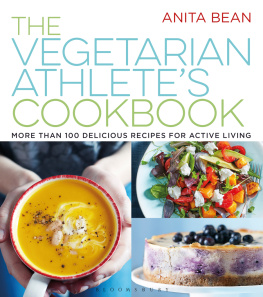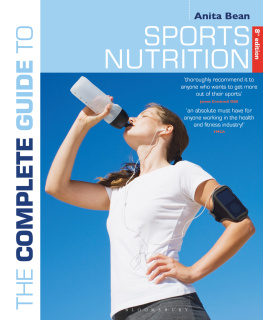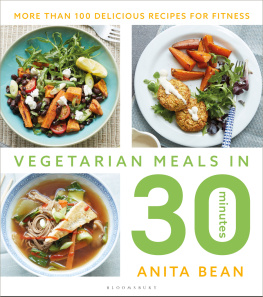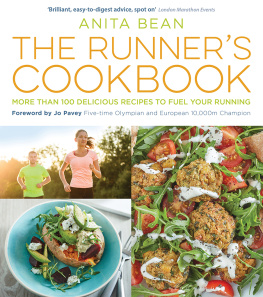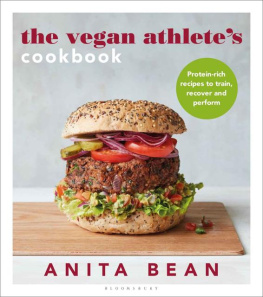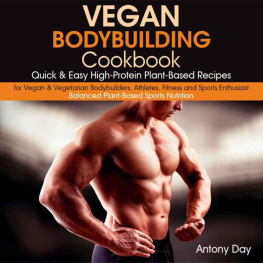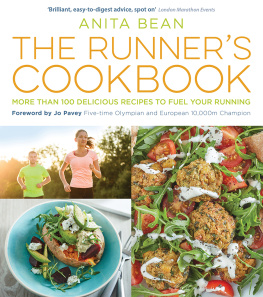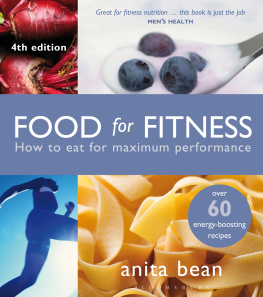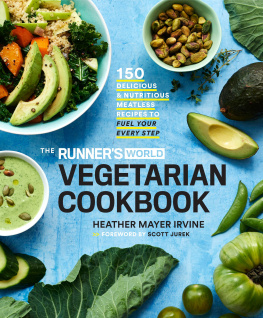Bloomsbury USA
An imprint of Bloomsbury Publishing Plc
| 1385 Broadway | 50 Bedford Square |
| New York | London |
| NY 10018 | WC1B 3DP |
| USA | UK |
www.bloomsbury.com
BLOOMSBURY and the Diana logo are trademarks of Bloomsbury Publishing Plc
This electronic edition published in 2017 by Bloomsbury Publishing Plc
First published 2017
Anita Bean 2017
Photography by Adrian Lawrence
Food styling by Emily Kydd
Design and illustrations by Louise Turpin
All rights reserved
You may not copy, distribute, transmit, reproduce or otherwise make available this publication (or any part of it) in any form, or by any means (including without limitation electronic, digital, optical, mechanical, photocopying, printing, recording or otherwise), without the prior written permission of the publisher. Any person who does any unauthorised act in relation to this publication may be liable to criminal prosecution and civil claims for damages.
No responsibility for loss caused to any individual or organization acting on or refraining from action as a result of the material in this publication can be accepted by Bloomsbury or the author.
The information contained in this book is provided by way of general guidance in relation to the specific subject matters addressed herein, but it is not a substitute for specialist dietary advice. It should not be relied on for medical, health-care, pharmaceutical or other professional advice on specific dietary or health needs. This book is sold with the understanding that the author and publisher are not engaged in rendering medical, health or any other kind of personal or professional services. The reader should consult a competent medical or health professional before adopting any of the suggestions in this book or drawing inferences from it. The author and publisher specifically disclaim, as far as the law allows, any responsibility from any liability, loss or risk (personal or otherwise) which is incurred as a consequence, directly or indirectly, of the use and applications of any of the contents of this book. If you are on medication of any description, please consult your doctor or health professional before embarking on any fast or diet.
ISBN: 978-1-63286-643-1 (PB)
ISBN: 978-1-63286-644-8 (eBook)
LIBRARY OF CONGRESS CATALOGING-IN-PUBLICATION DATA IS AVAILABLE
To find out more about our authors and their books please visit www.bloomsbury.com where you will find extracts, author interviews and details of forthcoming events, and to be the first to hear about latest releases and special offers, sign up for our newsletters.
Bloomsbury books may be purchased for business or promotional use. For information on bulk purchases please contact Macmillan Corporate and Premium Sales Department at .



INTRODUCTION
Y ou cant build muscle without meat! is the typical reaction I get when I tell people that Im a vegetarian athlete and competed as a bodybuilder for 10 years before winning the British Bodybuilding Championships in 1991. Most look at me in disbelief. Surely you need meat to compete? No way. My trophy may have gathered a bit of dust over the years ago, but it is solid proof that you can gain significant muscle and make it to the top of your sport without meat.
Whether you are already a committed vegetarian, are thinking of giving up meat, or simply fancy having one or two meat-free days a week, I hope that this book will inspire you to try something new and show you thatcontrary to popular beliefyou can build muscle without meat. Indeed, eating less meat is a fast-growing trend. According to a 2014 YouGov survey for Eating Better, one in five people have cut back on meat in the past year and one in three are considering eating less meat. For many people, eating less meat is an easier option than giving it up completely.
Although the number of vegetarians has remained more or less static over the past ten years, at around 3 percent of the population, there has been a significant rise in the number of flexitarianspeople who eat mostly vegetarian food but occasionally eat meat.
People are cutting out meat for many reasons, including concerns about health, animal exploitation and animal welfare, sustainability, and climate change. Recent decades have seen the meat consumption of rich countries increase, causing dangerously high levels of pollution and greenhouse gas emissions, an unprecedented rise in global temperature, widespread deforestation and loss of plant and animal species, and adding unnecessary pressure to already strained resources.
One of my aims in writing this book is to dispel the myths surrounding vegetarian diets. There is plenty of proof that a vegetarian diet is healthier than a typical meat-eaters diet. Its also better for the environment, more sustainable, a better use of land, and a good way of cutting your carbon footprint. Livestock farming generates huge amounts of greenhouse gases, which are major contributors to global warming and pollution. It also uses vast amounts of freshwater and is a grossly inefficient use of land. By eating less meat, you will be helping to protect the environment. For me, not eating meat is also an ethical choice; I dont think animals should be exploited. The truth is we dont need to eat meat to be healthy.
Until now, Ive not preached to anyone about not eating meat. Like politics and religion, the issue of meat eating often touches on peoples core ethical and moral values, which can be hard to change. But when people ask why I dont eat meat then Im happy to explain. My choice not to eat it was born partly from habit (my parents were vegetarian so I was brought up without meat) and an abhorrence of animal suffering, as well as a genuine dislike of the stuff. Although I never had to give up Sunday roasts or bacon, the idea of eating animals really doesnt appeal.
Theres no denying that it was difficult being a vegetarian child growing up in the 60s and 70s. I was the only one who didnt eat meat at my school; school dinners were a nightmare. I was given a plate of grated cheese or hard-boiled eggs instead of the meat that all the other kids were eating. I was a pooper at birthday parties because I wouldnt eat the sausage rolls. I was a problem when invited to friends houses for tea (what, you dont like fish sticks?). No one could understand why I wouldnt eat meat in those days.
Nowadays, of course, being vegetarian is a lot more acceptable socially and far easier to explain when eating out. My own children have plenty of delicious veggie options at school like lentil lasagna and Mediterranean pasta bake. When they visit friends, they dont have to apologize for being vegetarian. When I go out to eat, theres usually at least one or two dishes on the menu that dont contain meat. And supermarkets are now full of exciting vegetarian foods. Life has become so much easier!
Although my competitive days are over, Ive endeavored to help other vegetarian athletes succeed in sports. They include my own two daughters who are both competitive swimmers and train for more than 18 hours a week. Theyve never eaten meat, yet, over the years, have managed to enjoy success at county, regional, and national level.
In this book, I explain how a vegetarian diet can help you succeed in your sport or activity, which foods you need to focus on, how to avoid the common pitfalls of a vegetarian diet, and how you can put a vegetarian diet into practice. Ive devised more than 100 healthy and delicious recipes for breakfasts, main meals, soups, salads, desserts, snacks, smoothies, and shakes. Every recipe is designed to meet the needs of active people and athletes. They are all packed with fresh, nutritious ingredients so you know youll be getting the right combination of nutrients to help you perform better, build muscle, promote recovery and health. Best of all, they are all incredibly easy to make, require minimal cooking skills, and taste amazing.
Next page
